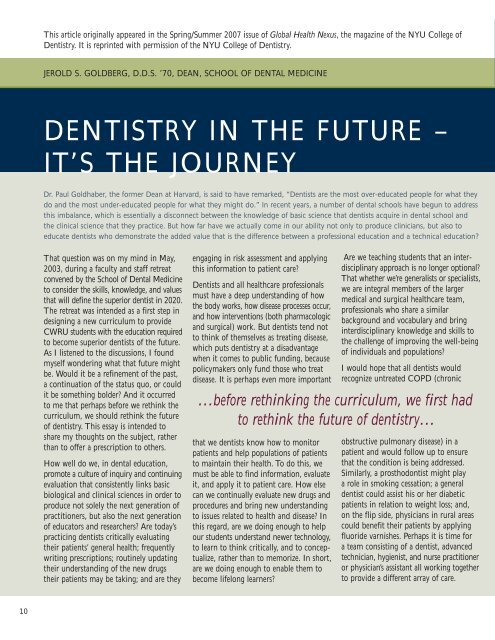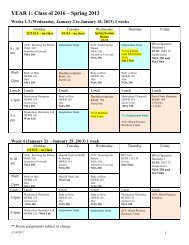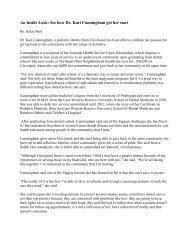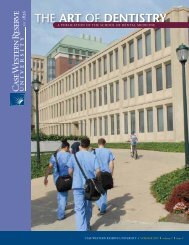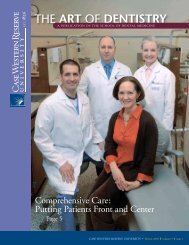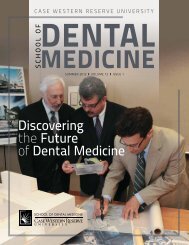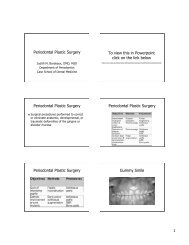THE ART OF DENTISTRY - School of Dental Medicine - Case ...
THE ART OF DENTISTRY - School of Dental Medicine - Case ...
THE ART OF DENTISTRY - School of Dental Medicine - Case ...
You also want an ePaper? Increase the reach of your titles
YUMPU automatically turns print PDFs into web optimized ePapers that Google loves.
10<br />
This article originally appeared in the Spring/Summer 2007 issue <strong>of</strong> Global Health Nexus, the magazine <strong>of</strong> the NYU College <strong>of</strong><br />
Dentistry. It is reprinted with permission <strong>of</strong> the NYU College <strong>of</strong> Dentistry.<br />
JEROLD S. GOLDBERG, D.D.S. ’70, DEAN, SCHOOL <strong>OF</strong> DENTAL MEDICINE<br />
<strong>DENTISTRY</strong> IN <strong>THE</strong> FUTURE –<br />
IT’S <strong>THE</strong> JOURNEY<br />
Dr. Paul Goldhaber, the former Dean at Harvard, is said to have remarked, “Dentists are the most over-educated people for what they<br />
do and the most under-educated people for what they might do.” In recent years, a number <strong>of</strong> dental schools have begun to address<br />
this imbalance, which is essentially a disconnect between the knowledge <strong>of</strong> basic science that dentists acquire in dental school and<br />
the clinical science that they practice. But how far have we actually come in our ability not only to produce clinicians, but also to<br />
educate dentists who demonstrate the added value that is the difference between a pr<strong>of</strong>essional education and a technical education?<br />
That question was on my mind in May,<br />
2003, during a faculty and staff retreat<br />
convened by the <strong>School</strong> <strong>of</strong> <strong>Dental</strong> <strong>Medicine</strong><br />
to consider the skills, knowledge, and values<br />
that will define the superior dentist in 2020.<br />
The retreat was intended as a first step in<br />
designing a new curriculum to provide<br />
CWRU students with the education required<br />
to become superior dentists <strong>of</strong> the future.<br />
As I listened to the discussions, I found<br />
myself wondering what that future might<br />
be. Would it be a refinement <strong>of</strong> the past,<br />
a continuation <strong>of</strong> the status quo, or could<br />
it be something bolder? And it occurred<br />
to me that perhaps before we rethink the<br />
curriculum, we should rethink the future<br />
<strong>of</strong> dentistry. This essay is intended to<br />
share my thoughts on the subject, rather<br />
than to <strong>of</strong>fer a prescription to others.<br />
How well do we, in dental education,<br />
promote a culture <strong>of</strong> inquiry and continuing<br />
evaluation that consistently links basic<br />
biological and clinical sciences in order to<br />
produce not solely the next generation <strong>of</strong><br />
practitioners, but also the next generation<br />
<strong>of</strong> educators and researchers? Are today’s<br />
practicing dentists critically evaluating<br />
their patients’ general health; frequently<br />
writing prescriptions; routinely updating<br />
their understanding <strong>of</strong> the new drugs<br />
their patients may be taking; and are they<br />
engaging in risk assessment and applying<br />
this information to patient care?<br />
Dentists and all healthcare pr<strong>of</strong>essionals<br />
must have a deep understanding <strong>of</strong> how<br />
the body works, how disease processes occur,<br />
and how interventions (both pharmacologic<br />
and surgical) work. But dentists tend not<br />
to think <strong>of</strong> themselves as treating disease,<br />
which puts dentistry at a disadvantage<br />
when it comes to public funding, because<br />
policymakers only fund those who treat<br />
disease. It is perhaps even more important<br />
that we dentists know how to monitor<br />
patients and help populations <strong>of</strong> patients<br />
to maintain their health. To do this, we<br />
must be able to find information, evaluate<br />
it, and apply it to patient care. How else<br />
can we continually evaluate new drugs and<br />
procedures and bring new understanding<br />
to issues related to health and disease? In<br />
this regard, are we doing enough to help<br />
our students understand newer technology,<br />
to learn to think critically, and to conceptualize,<br />
rather than to memorize. In short,<br />
are we doing enough to enable them to<br />
become lifelong learners?<br />
Are we teaching students that an interdisciplinary<br />
approach is no longer optional?<br />
That whether we’re generalists or specialists,<br />
we are integral members <strong>of</strong> the larger<br />
medical and surgical healthcare team,<br />
pr<strong>of</strong>essionals who share a similar<br />
background and vocabulary and bring<br />
interdisciplinary knowledge and skills to<br />
the challenge <strong>of</strong> improving the well-being<br />
<strong>of</strong> individuals and populations?<br />
I would hope that all dentists would<br />
recognize untreated COPD (chronic<br />
…before rethinking the curriculum, we first had<br />
to rethink the future <strong>of</strong> dentistry…<br />
obstructive pulmonary disease) in a<br />
patient and would follow up to ensure<br />
that the condition is being addressed.<br />
Similarly, a prosthodontist might play<br />
a role in smoking cessation; a general<br />
dentist could assist his or her diabetic<br />
patients in relation to weight loss; and,<br />
on the flip side, physicians in rural areas<br />
could benefit their patients by applying<br />
fluoride varnishes. Perhaps it is time for<br />
a team consisting <strong>of</strong> a dentist, advanced<br />
technician, hygienist, and nurse practitioner<br />
or physician’s assistant all working together<br />
to provide a different array <strong>of</strong> care.


